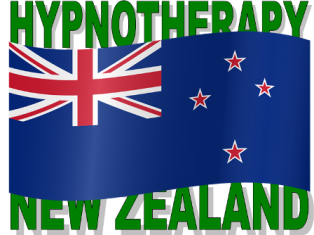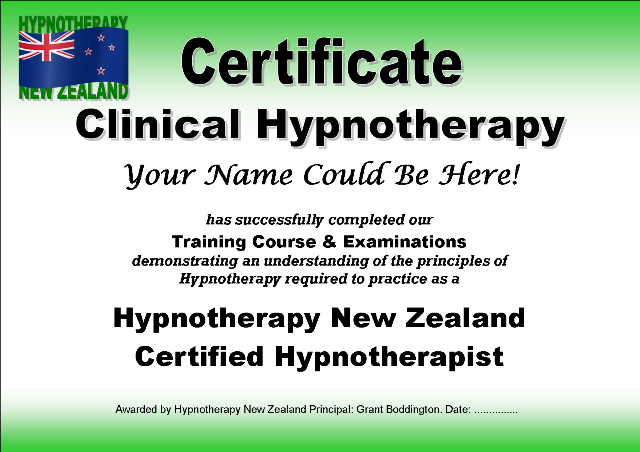
Grant's Top Tips and FAQ
Top Training
Tips for Choosing a Hypnotherapy Course in New
Zealand
by
Grant BoddingtonIf you intend to practice as a Hypnotherapist in New Zealand, I strongly suggest that you choose a homegrown NZ course that teaches a style to match New Zealanders' unique expectations and attitudes. Beware of scams from over-priced overseas-based training courses.
There are many factors that may influence your decision of which of the many NZ Hypnotherapy courses and tutors is right for you. You'll probably already have some idea as to why you want to learn Hypnotherapy and to what level. Maybe it's as a personal life-skill; to complement an existing natural therapy business; or to practice solely as a professional Hypnotherapist.
Whatever your reason, there is probably one or more Hypnotherapy courses to suit your needs - EG: Certificate, Higher Certificate, Diploma, or Advanced Diploma. With some training establishments you can start with a gentle home-study course to test the waters. You can even begin a career in Hypnotherapy with the better ones - as long as it's a properly structured Homestudy Course with support, examinations and a certificate on completion.
Or, a Classroom Course may be more your style and is certainly a popular option - especially if you're already certain about learning Hypnotherapy and have a good budget. Whatever your thoughts, I trust that my following personal views and opinions may assist you in your choice of a appropriately structured course and effective, personable tutor.
Tip #1
Understand the Difference between "Hypnotist" & "Hypnotherapist"
All Hypnotherapists are Hypnotists, but not all Hypnotists are Hypnotherapists! A Hypnotist hypnotises people - whereas a Hypnotherapist has learned how to use the state of Hypnosis in conjunction with a range of therapeutic techniques. Also, Hypnosis is not Hypnotherapy! Hypnosis is simply a state of trance - whereas Hypnotherapy is the combination of that state with various therapeutic techniques.
Caution: The internet abounds with short courses teaching you "How to Hypnotize". And yes, doing that can be very simple, but it won't turn you into a Hypnotherapist. To learn Hypnotherapy takes a much more comprehensive course that should ideally be presented & supported by a highly experienced Hypnotherapist!Tip #2
Styles of Hypnotherapy
Are you learning an "authoritarian" style or a "permissive" style? People of different cultures respond very differently to the two styles of Hypnotherapy/Hypnotherapist. Most NZ clients prefer the permissive approach from their Hypnotherapist. Kiwis may not respond so well to an authoritarian approach, learned from an overseas style of Hypnotherapy from an overseas trainer!
Caution: If you intend to practice as a Hypnotherapist in New Zealand, then having a local tutor teach you a locally acceptable style of Hypnotherapy can be much more rewarding for you and your clients.Tip #3
Chat With Your Tutor Before Signing Up
Who exactly is your tutor? Firstly and most importantly, I suggest very strongly that you call and talk in person with your potential tutor to make sure he/she is experienced, knowledgeable and personable. You'll be potentially working with, and be associated with, your tutor for many years after your course, so choose one with a genuine passion for openly sharing and passing on his/her knowledge and support. Your tutor should be prepared to become your mentor, your colleague (and possibly your friend) so it makes good sense to be of similar mindset, motivation and personality.
Caution: Some courses use several different trainers from the person who originally created the course. So make absolutely certain that the tutor you chat with is the same person who will actually be fronting the class for the majority of the lessons!Tip #4
Test the Communications Before Signing Up
Do the course providers answer their emails, phonecalls & messages? Two-way communications pre and post course are vitally important, so make absolutely certain that you can contact the tutor at any reasonable time - by a variety of methods. I highly recommend calling and talking with your potential tutor. If you have a question, or require support, you need to know your tutor is readily available and willing to assist. They should provide you with at least their business phone & mobile phone numbers; their constantly monitored email address and their physical & postal addresses.
Caution: Be wary of trainers with only anonymous contact details; (EG: Just a mobile phone and a PO Box). Also, if emailing, remember to check your email spam traps for replies too. Many legitimate emails find their way to this folder by mistake.Tip #5
Confirm the Reputation of Your Tutor/Course
What do others think of this person & their training? Popular, well established training courses and tutors will have plenty of recent testimonials, comments & reviews readily available, so please read them! Remember that a good number of recent positive testimonials probably means many happy students. Capitalise on the experiences and reports of those recent past students.
Is your chosen tutor an integral part of mainstream Hypnotherapy in New Zealand? A Registered Hypnotherapist, a member of one (or more) of the reputable NZ Hypnotherapy Groups/Associations? Ask your potential tutor how many years he/she has been both practicing and teaching Hypnotherapy in New Zealand?
Caution: Like any other business, Hypnotherapy training companies can change ownership. So check that the experience and the testimonials cited are for the current owner/tutor of the specific course that you're considering.Tip #6
Understand the Course Content
What does the course involve? Was all of the detailed information about the course easy to find and understand; or did you have to go hunting high and low for prices, dates, course content, etc? If a trainer is open and forthcoming about what is taught, when, where, and for what price, before the course; then he/she will probably be equally as sharing and supportive during and after the course.
There are two common and effective styles of Hypnotherapy: Suggestive and Analytical. And within those two styles there are also peculiarities of treatment structure more or less suited to different therapists and clients' issues. Ideally, Suggestive Hypnotherapy techniques should be learned, experienced and mastered separately - before progressing on to the more complicated and advanced Analytical Hypnotherapy styles.
Caution 1: If a course advertises a certain number of hours of training; check exactly how much of that is face-to-face time with the tutor (either in a classroom or as an online meeting) and how much is expected extra study or assignment time! Also, find out how much of the course content is not Hypnotherapy (EG: NLP, & other recently invented "protocols") but cited as part of the Hypnotherapy course.Tip #7
Caution 2: New Zealanders respond better to a very specific style of Hypnotherapy. Many of the overseas courses and/or trainers may teach a style that fits perfectly for clients in the USA or UK, but which could be totally unsuitable for NZ clients. So, if you plan to begin a practice in NZ, I strongly suggest that you chose a course designed and taught by Kiwis for Kiwis!
Qualifications Offered
Is their qualification recognised? Each individual trainer in NZ awards either their own independent qualification, or maybe one from an overseas organisation. This should be awarded immediately on completion and passing of the course examination(s). If it's not clearly advertised, ask what the standard time for assessing your examination might be and how soon afterwards you'll receive your qualification Certificate or Diploma from them.
Most trainers offer a range of their own different qualifications. Some refer to them as "Certificates" - EG: Certificate in Clinical Hypnotherapy and Higher Certificate in Clinical Hypnotherapy; while some prefer to call them "Diplomas" - EG: Diploma in Clinical Hypnotherapy and Diploma in Advanced Clinical Hypnotherapy. Be sure to research what content is covered in each course and that it is appropriate to your current knowledge/experience level in Hypnotherapy.
Caution 1: Avoid the temptation of trying to run before you can walk! Most people should ideally start with the more cost effective basic courses before they can fully understand and appreciate the more advanced techniques of the usually more expensive training. Trying a more cost-effective option is like testing the waters of Hypnotherapy - to see if it's right for you - and that you're right for it!Tip #8
Caution 2: Please also be aware that there is no NZQA qualification for Hypnotherapy in New Zealand! So while a training establishment might advertise NZQA accreditation, no-one can offer an NZQA Qualification in Hypnotherapy - because there quite simply is not one!
Caution 3: There is no official governing body for Hypnotherapy in New Zealand! A group or trainer might look, sound, or act "official" but they are not.
Financial Considerations
How much does the course cost? Make certain you pay a fair price for your Hypnotherapy education. After all, it's a safe natural therapy and should be easily within the reach of anyone who chooses to learn it. The course pricing (including GST if applicable) should be clearly advertised by the trainer and be realistically structured for a natural therapy. Ask about any application fee or deposit; or any other expenses such as buying certain publications in order to complete the course.
Caution 1: Make sure that a classroom course has a clear and confirmed date and venue before paying any money! Fees for classroom courses (and even some online courses) can be many thousands of dollars! If you do choose a "high cost" classroom course, look for a clear (in writing) course fee refund or transfer policy. Also, it pays to check what happens if the course is postponed or transferred to a different venue or city, because you may have to meet extra travel and accommodation costs if it's held in a different location from that which you originally signed up for!Tip #9
Caution 2:
Avoid becoming tempted by some over-priced courses that are padded out with many other non-Hypnotherapy skills. In my opinion, a face-to-face classroom course should be able to teach the essential skills of Hypnotherapy for around $300 - $400 per training day. ($2000.00 for a well-structured 5-day course.)
Legal Considerations
What are your rights & obligations? There is no official governing body for Hypnotherapy in New Zealand - even if some groups might appear to be very official! Therefore, Hypnotherapy in NZ is relatively free and unregulated; reflecting its fine safety and effectiveness record as a natural therapy. So therefore, there is little need for specific governmental legislation or control in NZ. You must of course run your Hypnotherapy practice in conjunction with the general laws of the land, including: Occupational Safety & Health; Inland Revenue; The Fair Trading Act; The Commerce Commission; The Health & Disability Commissioner; etc.
Caution: When you enrol for a course, be careful about signing away any future rights to practice as a Hypnotherapist. Some trainers may require you to do this! You might have to complete a certain part of, or even all of, their course and pass their examination processes before practicing professionally - or even before you hypnotise anyone at all, for any reason!Tip #10
Ask the Questions and Listen to the Answers
Will you make a good Hypnotherapist? Start out by using the basic interview skills of an effective Hypnotherapist with each of the course providers you are considering. Prepare a short list of the questions that you require answers for and note down the answers.
Caution: Be sure to insist on either a face to face meeting, a telephone call, or a video chat with the actual person who is offering the training rather than an email response that could be from anyone!Tip #11
Most important!
Call the trainer of any course you're considering and discuss details of the training with him/her before committing to any course.
Grant Answers your Questions
about his Certificate in Clinical Hypnotherapy Course
Why is this Hypnotherapy course such a bargain?
That's because in semi-retirement, I have very low expenses and love to share what I've learned for a very reasonable (and some say generous) price.
Will I learn enough to begin to practice as a Hypnotherapist?
Absolutely! And many others are already practising Hypnotherapy - either with this course alone, or by using this course to get them started.
How do I pay for the course?
The prefered option is by NZ Bank Transfer. We also accept Visa & Mastercard. All prices are in New Zealand Dollars. Overseas students are welcomed.
How much time do I have to complete a course?
Most people complete the course in just a few weeks of part-time study. For those who can dedicate themselves to full time study, it's usually just one to two weeks - or around 60 hours. Where the Support Module has been purchased, associated support expires 12 months after the original purchase of the Self-Study Course.
What support will I receive?
NB: Support is only offer to those who have purchased the Support Module. Then, I offer the very best of personal email, telephone, text and video chat support while you are studying. I (Grant) am there to help and can pretty much always find the time for a chat about Hypnotherapy! NB: All support is reactive! Contact me whenever you need assistance.
Once I start practising as a Hypnotherapist, how much can I expect to earn?
Depending on what area you live in, you'll probably begin by charging around $80.00 - $100.00 per session and move up from that as your experience and reputation grow. (Most experienced Hypnotherapists in NZ charge $100.00 - $200.00 per session!) The number of sessions per week will depend on your advertising, your all-important reputation and of course your competition. If you practice in a remote country area, then you might charge a little less - and in some city areas, you can charge more.
What sort of people is this Home Study Hypnotherapy course suitable for?
Well, the common denominator is that they are very definitely all good people, of all ages - from their early 20s right through to their 80s - and all experience levels. Many with no prior experience in Hypnotherapy - and many others who are already practicing as natural therapists and are ready to bring the efficacy and credibility of Hypnotherapy into their range of techniques. EG: Life coaches, drug & alcohol counsellors, youth workers, psychologists and medical doctors! Hypnotherapy can be easily learned and practiced by almost any caring and communicative person.
Where and when is my examination marked, and by whom?
There is a written examination (included with the Support Module) that you submit by email (or standard mail) directly to me (Grant). As your tutor, I personally assess them all and contact you for discussion - usually within 48 hours! So generally, the entire process from submission of your exam answers sufficient to pass the course, through to receipt of your Certificate in Clinical Hypnotherapy, takes only a couple of days!
Why is this the best Hypnotherapy training course to start with?
Because this training is comprehensive yet concise - and enough training to easily start you in a Hypnotherapy practice. In fact,over the past year the content has been enhanced to more than match some classroom courses. Plus, the already attractive pricing has been held to a reasonable and affordable level, which gives you the ability to test the waters of Hypnotherapy with my course, before considering or committing to the huge fees of a classroom course from a different source.
When should I move on to more advanced Hypnotherapy training?
The choice is totally yours, but I suggest you find your feet with the basics of Hypnotherapy first. You will certainly have been taught enough in this course to begin practicing competently as a Hypnotherapist. And then, when you are comfortable and competent, I suggest you either complete my new course extentions before considering a more expensive classroom training courses. I can advise you in this respect.
What are the regulations for practicing Hypnotherapy in NZ?
Because Hypnotherapy is a wonderfully safe and effective natural therapy, there are none! (Well, none that are specific to Hypnotherapy anyway.) Providing you are practicing ethically and safely and in accordance with the BSH Code of Ethics - and you are meeting all local and national requirements for your premises and general business practices (such as OSH, IRD, HDC, etc.) then you can legally practice as a Hypnotherapist in NZ with any level of training!
Final Thoughts
Hypnotherapy is a wonderfully simple and effective natural therapy, that is easily learned and practiced within reasonable time and money parameters. So please check carefully that the courses that you're investigating can offer you the results that you are seeking, within the time and money boundaries that you're comfortable with.
Want to know more?
Contact Me (Grant) for a friendly chat.
Please read the MANY testimonials from my previous students.
Contact Grant Boddington
Call, chat, or
text Grant Boddington 8:00am - 8:00pm - 7 days for
more information on the newest, most comprehensive version
of
this Hypnotherapy training course.
 Grant Boddington HNZ Registered Clinical Hypnotherapist |
Mobile: 021
447 481 Email: grant@grantboddington.com 134 Heads Road Wanganui 4501 New Zealand Map |
GL
Boddington
Copyright © 1996

